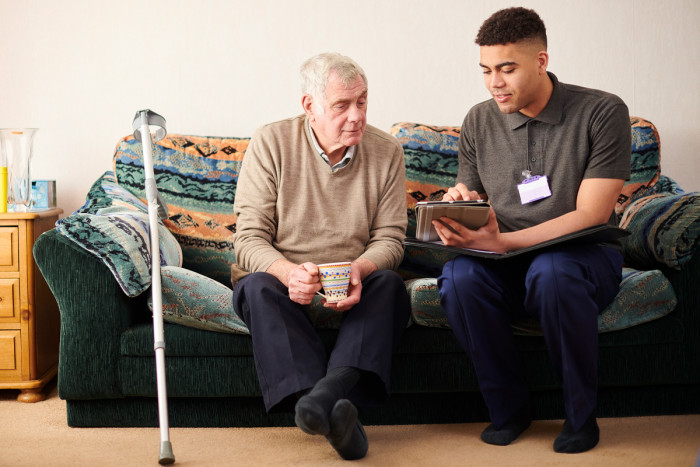Occupational Therapist
Kaiwhakaora Ngangahau
Alternative titles for this job
Occupational therapists provide therapy and support to people with limited ability to carry out everyday activities because of illness, injury or disability.
Pay
Occupational therapists usually earn
$58K-$119K per year
Source: Te Whatu Ora/DHBs and NZEI, 2022- 2025.
Job opportunities
Pay
Pay for occupational therapists varies depending on experience, qualifications and employer.
Occupational therapists working for Te Whatu Ora Health NZ (former DHBs)
- Occupational therapists usually earn $58,000 to $86,000 a year.
- Senior occupational therapists who supervise staff can earn $87,000 to $119,000.
Occupational therapists working in schools
- Occupational therapists working as interns usually earn $55,00 a year. In April 2024 this will rise to $57,000 a year.
- Occupational therapists can earn $68,000 to $115,000 a year. In April 2024 this will rise to $70,000 to $118,000 a year.
Pay for occupational therapists working in private practice depends on their experience and the success of their business.
Sources: Auckland Region District Health Boards/PSA, ‘Allied, Public Health, Scientific & Technical Multi Employer Collective Agreement, expires 30 June 2023’, 2022; District Health Boards/PSA, ‘Allied, Public Health, Scientific & Technical Multi Employer Collective Agreement, expires 30 June 2023’, 2022; and NZEI, 'Ministry of Education and NZEI Te Riu Roa Collective Agreement for Field Staff from 2023 - 2025'.
- NZEI website 'Ministry of Education and NZEI Te Riu Roa Collective Agreement for Field Staff from 2023 - 2025 (PDF -778 KB)
- PAYE.net.nz website - use this calculator to convert pay and salary information
(This information is a guide only. Find out more about the sources of our pay information)
What you will do
Occupational therapists may do some or all of the following:
- assess clients' abilities and help them gain or regain skills
- plan and direct therapy treatment, including physical and social activities
- carry out workplace or home safety assessments
- provide advice on equipment or recommend changes to home or work environments
- advise clients on changes to their lifestyle to help them with daily activities
- observe and report on clients' progress.
Skills and knowledge
Occupational therapists need to have knowledge of:
- occupational therapy methods and research
- psychology, biology and anatomy
- how to negotiate with people and motivate them
- different cultures and customs.
Working conditions
Occupational therapists:
- may do shift work that includes evenings or weekends
- may work in a variety of places, including hospitals, private clinics, nursing homes, workplaces and schools.
What's the job really like?

Clare Roberts
Occupational Therapist
What got you interested in becoming an occupational therapist?
“I’d always been interested in health and wellbeing and it was the holistic nature of occupational therapy that sparked my interest. It’s a fascinating field that acknowledges the link between peoples’ occupations and the body, mind, spirit and environment."
What are some of the things you like about your job?
“I really enjoy the process of working alongside young people and whānau, supporting goal setting and problem solving around what they need and what they want to do.
“I also enjoy seeing people’s awareness develop around the interaction between meaningful activity and wellbeing and how they can take an active role in their own healthcare and empowerment.”
What hours do you work?
“I work a 40-hour week and have the weekends off. Sometimes, I’m rostered on during public holidays because I work in a children’s hospital. That works OK for me as I can plan ahead as needed.”
What suggestions do you have for someone interested in starting out in this job?
“Meet and talk with working occupational therapists to understand the role and opportunities.
“Check out the information available on the Occupational Therapy New Zealand website and try and arrange to observe an occupational therapist at work to get an idea of what’s involved.”
Occupational Therapist video
Kerry Thornton talks about life as an occupational therapist – 2.53 mins
This is Foxy, and the more that I need to concentrate, the more attention she wants.
My name's Kerry Thornton, and I'm an occupational therapist.
Occupational therapists work with people that have had significant life-changing
medical conditions or events or injuries.
We help people to live normal,
active lives. My typical day is to do the reports
from the day before as much as I can. I'll go out on visits for the day,
and so the visits might be an assessment, which could be for a wheelchair,
for some equipment, or for a housing modification,
or it could be a rehab session.
So I'm just at the house of a client who is going to be coming home from the
spinal unit using a wheelchair,
and so I just need to measure up what we can do for a ramp.
This is good for the technical people. You just measure the height of the step,
and then we put it into a helpful ramp gradient calculator.
So for a 230 millimetre step,
we need 2,760 millimetres of ramp. I decided to
become an OT after I went to a careers fair and heard about it,
and it sounded like a really interesting job.
You can travel with it and you could work in a whole bunch of different
settings, like hospitals, schools and retirement homes. To be an OT,
you need to do a degree in occupational therapy. Once you've done your degree,
you tend to get a job as an occupational therapist,
and then you do training on the job to get more familiar with the role,
and then you can just carry on your career wherever you want to go. So in
this scenario, we've got Rochelle, who is our patient.
She has a broken collarbone and she's hurt her left wrist from a fall.
I'm teaching her how to use a one-handed chopping board.
What we do here is we use these spikes, push this down,
but just be careful that you don't stab yourself with the spikes,
and then you can just cut. Beautiful.
My favourite thing about this job is when you give somebody a
solution to their problem,
it could be a piece of education about their brain injury,
it could be a piece of equipment, it could be a housing modification,
but when you give them something and then their life becomes easier,
and they get access to an activity that they previously couldn't do,
that joy that they get and that hope that they get that, oh,
if I can solve this problem, I can solve another problem and another problem:
they begin to see the life that they want being built.
And that's the best bit about this job.
Entry requirements
To become an occupational therapist you need to complete one of the following:
- Bachelor of Health Science (Occupational Therapy) at Auckand University of Technology (AUT)
- Bachelor of Occupational Therapy at Otago Polytechnic or Waikato Institute of Technology (Wintec).
- Auckand University of Technology (AUT) website - Bachelor of Health Science (Occupational Therapy)
- Otago Polytechnic website - Bachelor of Occupational Therapy
- Waikato Institute of Technology (Wintec) website - Bachelor of Occupational Therapy
Occupational therapists also need to be registered with the Occupational Therapy Board of New Zealand (OTBNZ) and have a current Practising Certificate.
The Vulnerable Children Act 2014 means that if you have certain serious convictions, you can’t be employed in a role where you are responsible for, or work alone with, children.
Secondary education
NCEA Level 3 is required to enter tertiary training. Useful subjects include biology, chemistry, health and physical education.
Personal requirements
Occupational therapists need to be:
- positive and encouraging
- approachable, with good communication skills
- skilled at report writing
- analytical and observant
- good at problem solving
- good at time management.
Useful experience
Useful experience for occupational therapists includes:
- working with children, the elderly or disabled people
- coaching and working with groups of people
- first aid experience.
Physical requirements
Occupational therapists need to be reasonably fit and healthy as they may have to help lift patients.
Registration
Occupational therapists need to be registered with the Occupational Therapy Board.
Find out more about training
- Occupational Therapy New Zealand - Whakaora Ngangahau Aotearoa
- (04) 473 6510 - membership@otnzwna.co.nz - www.otnz.co.nz
What are the chances of getting a job?
High competition for entry-level jobs
Employers prefer to hire occupational therapists with experience, so competition is high for entry-level jobs.
New graduates have a better chance of finding work where adequate supervision is available such as in private clinics or public hospitals.
According to the Occupational Therapy Board of New Zealand, 3,013 occupational therapists worked in New Zealand in 2018.
Ageing population and mental health needs increase demand for occupational therapists
Job opportunities for experienced occupational therapists are good because:
- New Zealand's large ageing population is using more occupational therapy services to remain independent and active
- demand is increasing for occupational therapists to provide mental health and addiction services.
Occupational therapist appears on Immigration New Zealand's Green List. This means the Government is actively encouraging skilled occupational therapists from overseas to work in New Zealand.
Types of employers varied
Occupational therapists may work for:
- district health boards (public health services and hospitals)
- private occupational therapy or multi-disciplinary practices
- primary health care providers
- rest homes, hospices or private hospitals
- rehabilitation services
- primary and secondary schools
- ACC (as case managers)
- non-governmental organisations (NGOs) such as charities or trusts
- the Ministry of Education
- local government.
Many occupational therapists are self-employed.
Sources
-
Immigration New Zealand, Green List, January 2023, (www.immigration.govt.nz.
-
Kenning, M, Acting Chief Executive, Occupational Therapy Board of New Zealand, careers.govt.nz interview, May 2021.
- Ministry of Education, ‘Support Staff in Schools’ Collective Agreement - December 2019 to February 2022’, 30 June 2020, (www.education.govt.nz).
- Ministry of Health, 'Health Workforce Funding Review - Current State Report', November 2020, (www.health.govt.nz).
- Occupational Therapy Board of New Zealand website, accessed May 2021, (www.otboard.org.nz).
- Occupational Therapy New Zealand website, accessed May 2021, (www.otnz.co.nz).
- Scoop, ‘Covid-19 Workplace Recovery Opens up Job Opportunities in Healthcare’, 19 March 2021, (www.scoop.co.nz).
(This information is a guide only. Find out more about the sources of our job opportunities information)
Progression and specialisations
Occupational therapists may progress to work in management, teaching or research roles, or move into contracting work.
Occupational therapists can specialise in a specific area, such as:
- burn management
- driving assessments
- hand therapy
- mental health and addictions
- geriatrics (elderly people)
- paediatrics (children).
Last updated 21 December 2023


